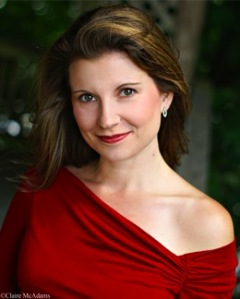Musical pillow talk ends New World’s year with offbeat chamber program

Mezzo-soprano Amanda Crider performed Ravel's "Songs of Madagascar" Sunday with members of the New World Symphony.
Rarely will you hear sofa pillows played as skillfully as they were Sunday at a chamber music concert by members of the New World Symphony.
The upholstery was among the weird instrumentation required for the late Mauricio Kagel’s “Southwest,” from The Compass Pieces, a work intended to evoke the different parts of the globe. Among the other instruments were large gourds in tubs of water and a conch shell, as well as a piano, clarinet, harmonium, string quartet and bass. In its odd way, this combination of instruments worked, creating an east-meets-west feel, with an edge of mystery and menace.
Born in Argentina, Kagel wrote a great deal of film music in his career, spent mainly in Germany. “Southwest” had an atmospheric, background music quality at times, moody and suspenseful, as if it were movie music without the movie.
Percussionist Jay Ganser, who served as pillow-master, beat on the pillows with his hands to created sounds that resembled drumming on some South Pacific island, as the piano and bass played tense, pensive figures. The conch shell, when blown, created a primitive, almost alarming sound, over frantic figures in the strings, clearly difficult passages played with great skill by the New World musicians. Joshua Gersen, the New World’s conducting fellow, led the performance in a skillful manner, preventing this unique ensemble from degenerating into potential cacophony.
The mezzo-soprano Amanda Crider, who has sung locally with Seraphic Fire and Florida Grand Opera, was the soloist in Ravel’s Songs of Madagascar, three settings of French poems about the island from the 18th century accompanied by flute, cello and piano. Crider sings with a plush tone and dead-on intonation. In the erotic song Nahandove, she didn’t push the sensuality too far, singing in an almost chaste manner that let the words, music and the tonal beauty of her own voice carry the work. The second song, a call for revolution at white colonial rule, opened with the cries “Aoua! Aoua!” that came off with an almost brutal power, as she hit the words hard in a shocking and effective contrast to the preceding eroticism.
Brahms’ early String Sextet No. 1 is a great work that isn’t heard much in a chamber music world dominated by touring quartets, pianists and an occasional trio. The six members of the New World Symphony gave a creditable performance, despite fairly frequent intonation problems and a sense that the music felt hurried.
The first movement drove forward in a way that didn’t fit the music, with the yearning second theme in particular feeling rushed, without the relaxed spirit of Brahms in his mellower moments. The second movement was vastly better, with the ensemble giving a craggy power to the composer’s darkly noble theme and variations. The scherzo came off in a light, accurate and energetic manner.
Posted in Performances
Leave a Comment
Mon Dec 19, 2011
at 2:28 am
No Comments






